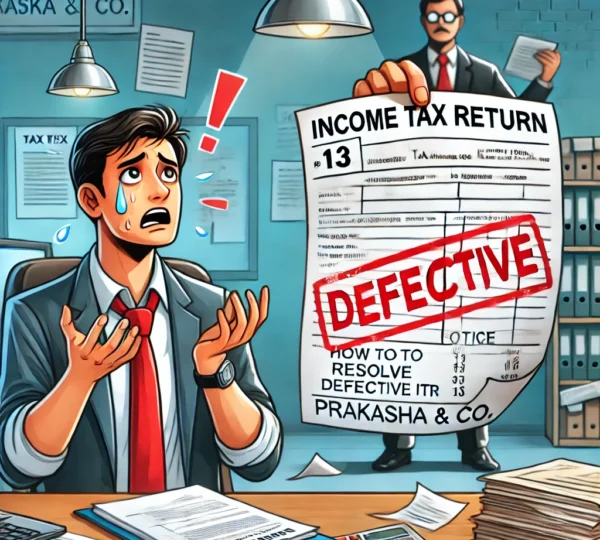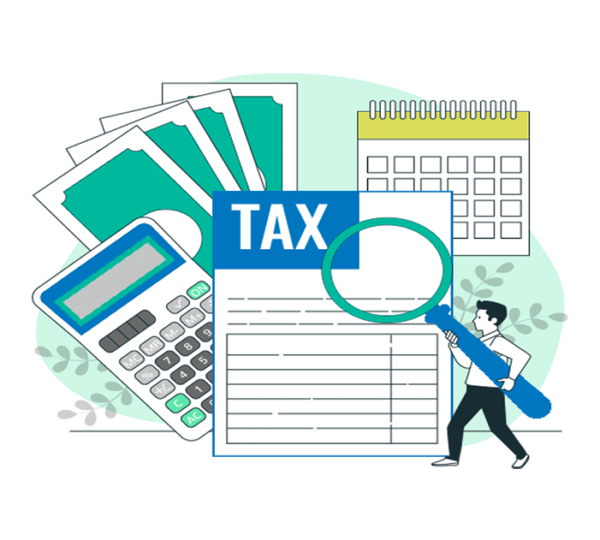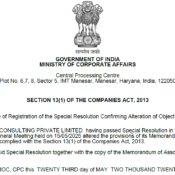Section 139 (9) IT Act: How to Fix the Defective ITR?
How do you rectify the defect in your return of income tax?
After you file your Income tax return, at some point you get a message from the income tax office that your file is defective, meaning it is very important that you resolve this defect-filled file immediately as per the provisions of the Income Tax Act, 1961. Here is Section 139(9) IT notice to Fix that Defective ITR. Here’s how the Section 139(9) IT notice to Fix that Defective ITR explained.
Common Grounds for Defective Tax Returns
Filing an Income Tax Return (ITR) accurately is crucial to avoid defects that can lead to complications, including penalties and scrutiny by the Income Tax office. Below are some of the most common reasons why an ITR may be treated as defective returns:
- Selecting the incorrect ITR Form
One of the most common errors is choosing the wrong ITR form after filing one’s Returns. It does not match with income type earned by him/her. For example, if someone has income from Salary, plus income from Shares or investments etc but while filing he had chosen ITR-1 whereas capital gain details require forms like ITR-2 or ITR 3 or ITR 4., because you were using the wrong form, they will be treated as Defective Returns.
- Missing out on Complete Income Details
Undisclosed Crypto Transactions: Due to the rise in popularity of crypto, it is important to report any income or transaction involving digital currency. Failure to report this income may result in a defective return.
Income Reporting errors: Failure to declare gross income, especially when a Form 26AS return shows more income than shown under income heads, can trigger a report of error. This often occurs when the amount declared in Form 26AS Tax is deducted at source (TDS). does not match the details.
- Irregularities in Income Bifurcation
Mismatch with Form 16/16A: Inconsistency with Form 16/16A: Errors in allocating income to incorrect heads or incorrect conformity with Form 16 or Form 16A may result in lead to defective returns.
Business or Professional Income: Individuals holding income from another source like freelancing, business or profession but failing to report it under the proper heads or using an incorrect form may receive a defective notice.
- Errors in Self-Assessment Tax Details
Entering incorrect details like tax paid BSR code, Challan Identification Number (CIN), or incorrect bank details for the tax paid can lead to discrepancies and result in a defective return.
Table of Contents
ToggleConsequences of a Defective Return
Invalid Return: If the defect is not corrected within the stipulated time (15 days from the date of communication), the return is treated as invalid, and you may face penalties or scrutiny.
Loss of Compliance: An invalid return affects your financial records and compliance status, leading to further complications.
Key Takeaways
Use the Correct ITR Form: Ensure you are using the appropriate ITR form that reflects all your sources of income.
Disclose All Income: Include all income details, including those from cryptocurrencies and other digital transactions, in your return.
Verify Income Details: Cross-check your income bifurcation with Form 16 as Salary and /16A with appropriate income head as per section wise and Form 26AS to avoid mismatches.
Double-check Tax Payment Entries: Verify the accuracy of the self-assessment tax paid details before filing.
By being mindful of these common errors, you can prevent your ITR from being flagged as defective, ensuring a smoother and more compliant tax filing process.
Responding to a Defective Return Notice
Rectification of the Defective Return:
-
- Upon receiving a notice under Section 139(9), you have been given an opportunity to rectify the defect within 15 days. must correct the issues specified in the notice and re-file the return.
- This process involves submitting a “Defective Return” under the notice received. The return is essentially the same return with the necessary corrections, not a “Revised Return.”
Revised Return vs. Defective Return:
-
- Defective Return: This is filed to correct the defects pointed out by the Income Tax Department as per Section 139(9). The filing of this corrected return is mandatory to avoid the original return being treated as invalid.
- Revised Return: This is filed under Section 139(5) if the taxpayer discovers any omissions or wrong statements in the original return. A revised return can be filed voluntarily, even if no defect notice has been received. The time limit for filing a revised return is 31st December of the relevant assessment year or before the completion of the assessment, whichever is earlier.
Given the scenario where a return is flagged as defective, the taxpayer must file a defective return within the stipulated time frame to rectify the issues mentioned in the notice. Filing a revised return is a separate remedy available under the law but should not be confused with the filing of a defective return.
Key Points to Understand in Defective Return:
- Defective Return Notice (Section 139(9)):
- When the Income Tax Department issues a defective return notice under Section 139(9), the taxpayer is required to correct the defects within 15 days by submitting a response to the defective return notice.
- Filing a Revised Return (Section 139(5)):
- A revised return can be filed under Section 139(5) if you realize there are mistakes, omissions, or any other issues in the originally filed return.
- The revised return must be filed within the specified time limit, i.e., before 31st December of the relevant assessment year or before the completion of the assessment, whichever is earlier.
Impact of Filing a Revised Return
- Supersedes the Original Return: When a revised return is filed, it supersedes the original return. This means that the revised return becomes the effective return for that assessment year, and any earlier return, including the one identified as defective, is no longer considered.
- Addressing the Defective Notice: If the revised return corrects all the defects mentioned in the defective notice, it would automatically render the defective notice irrelevant. The Income Tax Department will consider the revised return as a valid return for processing and assessment purposes.
Practical Implication:
- No Separate Response Needed for the Defective Notice: Once the revised return is filed, there is no need to separately respond to the defective return notice. The defects identified in the original return would be considered rectified by the revised return, provided that the revised return includes all the required corrections.
For further assistance in handling such matters, you may reach out to Prakasha & Co., Bangalore—leading legal and tax advisory services in Bangalore.
Consequences of Not Rectifying a Defective Return
- Invalidation of the Return:
- If a defective return notice issued under Section 139(9) is not rectified within the stipulated time (15 days), the original return is treated as invalid. This means that it is as if the return was never filed at all.
- Implications of an Invalid Return:
- Loss of Filing Date: The date of filing the original return will no longer be recognized. This can have significant consequences, such as losing the benefit of timely filing, which may lead to penalties or loss of carry-forward of losses.
- Penalties: Since the return is treated as not filed, the taxpayer may be liable for penalties under various provisions of the Income Tax Act. For example, if the return is treated as belated, a penalty under Section 234F may be levied.
- Manual Scrutiny: An invalidated return increases the likelihood of the Income Tax Department selecting the case for scrutiny assessment under Section 143(2). During scrutiny, the Assessing Officer may examine the return in detail, and any discrepancies could lead to additional tax demands, interest, and penalties.
- Legal and Financial Risk: Failure to address the defective return may lead to unnecessary legal complications and financial liabilities. The taxpayer may face higher scrutiny and legal proceedings, which can be both time-consuming and costly.
Importance of Timely Rectification
- Maintaining Financial Discipline: Timely correction of a defective return is essential to maintain financial discipline in your tax reporting. It ensures that your return is valid, accurate, and in line with the law.
- Avoiding Future Complications: By addressing the defective return within the stipulated period, you can avoid the potential risks of penalties, interest, scrutiny assessments, and other legal actions by the Income Tax Department.
Examples of a Defective Return Notice
Email Subject: Important – Rectify the defect in your Return of Income
From: intimations@cpc.incometax.gov.in
Date: Tue, 4 Jul 2023
To: abcd@gmail.com
Name: ABCD
PAN: ABCDPS3774A
Assessment Year: 2023-24
Acknowledgment No.: ABCD31680030723
Date of Filing Return: 03-Jul-2023
Date of Communication: 04-Jul-2023
DIN: ABCD/2324/G5a/ITR000506347381
Status: Return is defective
Reason for Defect:
The gross receipts shown in Form 26AS are higher than the total receipts shown under all heads of income in the return. As a result, the credit for TDS claimed in the return does not fully correspond with the disclosed income. This discrepancy makes the return defective under Section 139(9).
Required Action:
You need to file a corrected return:
- Option 1: Disclose the complete receipts as per Form 26AS.
- Option 2: Adjust the TDS claim to match the income disclosed in the return.
Deadline: Respond by 19-Jul-2023.
How to Rectify the Defect:
- Log in to the Income Tax e-filing portal: www.incometax.gov.in.
- Go to ‘e-Proceedings’ under the ‘Pending Actions’ menu.
- View the Defective Notice: Click on ‘View Notices’ under the relevant proceeding.
- Respond: Click on ‘Agree or Disagree’ under ‘Submit Response.’
- Correct the Return: Select ‘Agree’ and use the ‘Offline Utility’ Form’ to correct the return.
- Submit and e-verify the corrected return.
Tips to Avoid Future Defects:
- Use the Tax expert’s help or Tax software utility on the Income Tax website to ensure accuracy.
- Ensure that all income and corresponding TDS details match and are fully disclosed.
By promptly rectifying the defect as per the notice, you can avoid the return being treated as invalid and prevent potential scrutiny, penalties, and other complications. Addressing these defects on time is crucial to maintaining proper financial discipline and ensuring compliance with tax regulations.
2nd Example of a Defective Notice
Email Subject: Important – Rectify the defect in your Return of Income
From: intimations@cpc.incometax.gov.in
Date: Fri, 28 Jun 2024
To: xyz@gmail.com
Name: Xyz
PAN: XYZAPK1330R
Assessment Year: 2024-25
Acknowledgment No.: XYZ57890280624
Date of Filing Return: 28-Jun-2024
Date of Communication: 28-Jun-2024
DIN: XYZ/2425/G5a/ITR000623911674
Status: Return is defective
Reason for Defect:
You filed your return using ITR-1, but your Form 26AS shows TDS deductions under sections like 194IA, 194C, etc., which require a different ITR form. ITR-1 is not appropriate for reporting these incomes.
Required Action:
- File a Corrected Return: You must file a new return using the correct ITR form (not ITR-1) that includes all relevant schedules to report your income and TDS as per Form 26AS.
- Deadline: Respond by 13-Jul-2024 to avoid your return being treated as invalid.
How to Rectify the Defect:
- Log in to the Income Tax portal: www.incometax.gov.in.
- Access the Notice: Go to ‘e-Proceedings’ under the ‘Pending Actions’ menu and view the notice.
- Respond: Click on ‘Agree’ and select the correct ITR form to refile your return with the necessary corrections.
- Submit and e-verify the revised return.
Key Tip: Section 139 (9) IT Act: How to Fix the Defective ITR?
Always use the correct ITR form based on your income type to avoid such defects. Ensure all income and TDS details are fully disclosed.
By filing the correct ITR form with all required details within the given timeframe, you can avoid your return being invalidated and ensure compliance with the tax regulations.
Defective Notice and Response Process:
Go to Dashboard Overview, next click on the
- Pending Actions
- e-Proceedings
- View Notices
- Submit Response
Defective Notice Details:
- Proceeding Name: Defective notice u/s 139(9)
- Assessment Year: 2024-25
- Return Acknowledgement Number: XYZ087310280724
- Document Identification Number: XYZ/2425/G5a/ITR000678779908
- Communication Date: 29-Jul-2024
- Response Due Date: 13-Aug-2024
Error Code: RULE_37BA_194M_001
Error Description:
You filed your income-tax return using ITR-1. However, your Form 26AS indicates that TDS was deducted under sections like 194IA, 194M, etc., which require a different ITR form. ITR-1 does not have the necessary schedules to report this income.
Probable Resolution:
You need to file a corrected return using the appropriate ITR form that includes the relevant schedules for the income reported in Form 26AS.
Steps to Respond:
- Log in to the Income Tax e-filing portal: www.incometax.gov.in.
- Navigate to ‘e-Proceedings’: Under the ‘Pending Actions’ menu, click on ‘e-Proceedings.’
- View the Notice:
- Click on ‘View Notices’ under the ‘Defective Notice u/s 139(9)’.
- Download the defective return and review the details provided.
- Submit Response:
- Click on ‘Submit Response.’
- You will be asked, “Do you agree with the defect?” Select ‘Agree’ if you concur with the defect details.
- If your return was filed using the wrong form (e.g., ITR-1), you must prepare and upload the correct ITR form offline (e.g., ITR-2, ITR-3, etc.) that aligns with your income details as per Form 26AS.
- Attach the corrected ITR file in the required format and proceed to submit.
Alternative Approach:
If the filing due date has not passed, you can select the option to file a Revised Return instead of responding directly to the defective notice. The due date for filing a revised return for FY 2023-24 (AY 2024-25) is 31 December 2024. Filing a revised return with all correct details will automatically rectify the defect.
Filing Due Date for individuals
- Revised Return: 31 December 2024
- Late Return: 31 December 2024 (with late fees)
- Updated Return: 31 March 2027 (two years from the end of the relevant Assessment Year)
Key Takeaways:
- Correct Form Usage: Always ensure that the ITR form used is appropriate for your income type as per Form 26AS.
- Timely Response: Address the defective notice promptly to avoid the return being treated as invalid.
- Filing Options: If within the due date, filing a revised return is an effective solution to rectify defects.
By doing these steps, you can get your income tax return correctly filed and compliant with the law.
- For any assistance with defective return filing and ensuring a smooth ITR process, contact Prakasha & Co., Bangalore’s leading tax professionals, serving businesses for over 15 years. Contact: 07019827351 email: crp@prakashaAndco.com
Like Us On Facebook

Our Client's Review
EXCELLENTTrustindex verifies that the original source of the review is Google. Best place to file ur GST n IT returns .. They respond quickly, communicate well and get ur work done as per ur needs in a very short time ..Posted onTrustindex verifies that the original source of the review is Google. Best place for Income tax filingPosted onTrustindex verifies that the original source of the review is Google. Of all the CA, CS teams I have interacted with, they are the most prompt and organized. I have taken their services for almost 3 years now for various things like income tax queries, income tax filing, networth certificates, and compliance certificates. They always display a clear understanding of the law and are also able to explain it to you in layman terms. Overall a very resourceful and courteous team. Thank you for the support!Posted onTrustindex verifies that the original source of the review is Google. Best company secretary I bangalore ever seen such quick quality servicePosted onTrustindex verifies that the original source of the review is Google. Prakasha & Co has been a lifesaver for me when it comes to my tax dispute and filings with IT office. They are always very responsive and helpful whenever I have any questions or issues, I recently had an issue with my sister business GST filings, and they were able to quickly identify the issue and help me resolve it. They really go above and beyond to make sure their clients are taken care of.Posted onTrustindex verifies that the original source of the review is Google. ''The team at Prakasha& Co made sure my company was compliant with all the legal requirements. Their attention to detail and timely response was truly remarkable."Posted onTrustindex verifies that the original source of the review is Google. "I was impressed with the level of customer service provided by Prakasha& Co. They were always available to answer my questions and provide guidance throughout the company registration process."
Important Links
- Top 10 GST Registration Consultants in Bangalore
- Top 10 Best Income Tax Lawyers in Bangalore
- Top 10 Trademark Registration Consultants in Bangalore
- GST Registration in Bangalore
- Private Limited Company Registration in Bangalore
- Partnership Firm Registration in Bangalore
- Proprietorship Registration in Bangalore
- Trademark Registration in Bangalore
- Audit Frim in Bangalore
- CA Firm in Bangalore
- Accounting Services in Bangalore
- GST Lawyers in Bangalore
- Payroll Services Provider in Bangalore
- Payroll Consultant in Bangalore
- Income Tax Lawyer in Bangalore
All Categories
- Audit
- Blogs
- Bookkeeping Services
- Company Registration
- Company secretary Legal & Chartered Accountant
- Digital Signature Certificate (DSC) Services
- FSSAI Registration and Consultation
- GST
- Income tax
- Partnership Firm Registration
- Payroll Services
- Risk Management Services
- Startup Registration Process
- Trademark Registration
- Uncategorized









